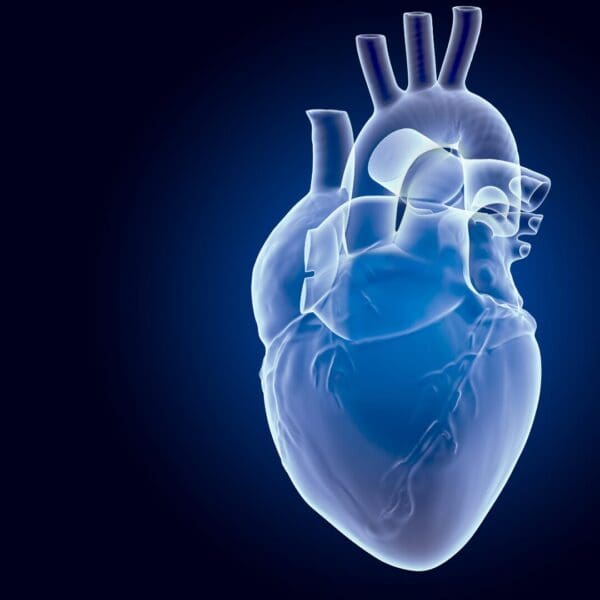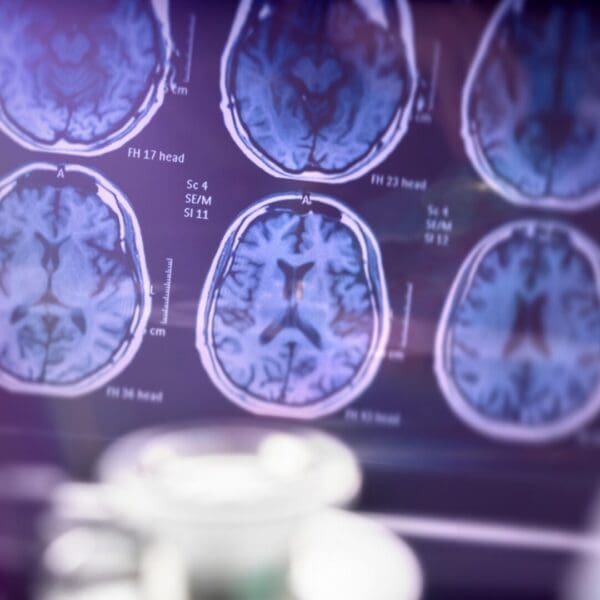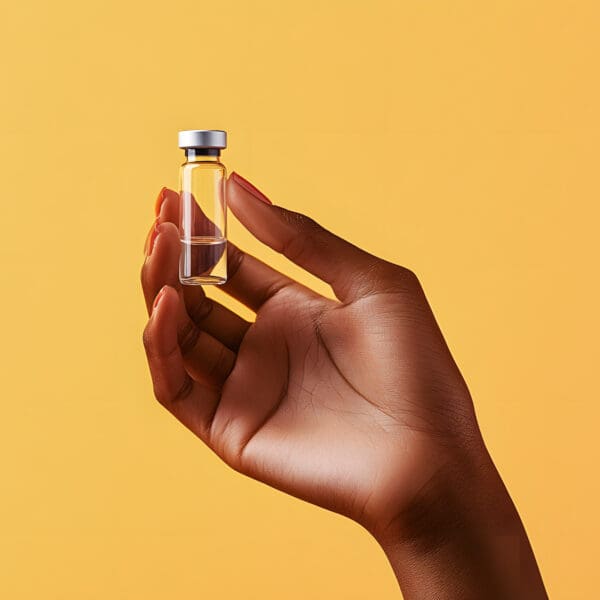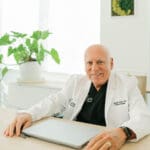
Autophagy is one of the most important processes your body uses to stay healthy, slow aging, and prevent disease. The word literally means “self-eating,” but do not let that alarm you. It is your body’s natural way of cleaning house, breaking down old or damaged cell parts and recycling them into fresh, functional components.
Think of it as your body’s built-in recycling and repair system, constantly working to keep your cells younger, cleaner, and stronger.
In recent years, research has shown that supporting autophagy can promote longevity, protect the brain from age-related decline, improve heart and metabolic health, and keep your cells functioning at their best as you age. The best part is that there are natural ways to encourage this process through lifestyle choices and targeted therapies.
What Exactly Is Autophagy
The term comes from the Greek words “auto” meaning self and “phagy” meaning eating. It was first discovered in the 1960s but did not gain wide recognition until 2016, when researcher Yoshinori Ohsumi won the Nobel Prize for uncovering how it works.
Here is the simplified version of the process:
- Trigger: When cells sense stress such as lack of nutrients, damaged proteins, or oxidative stress, they initiate autophagy.
- Capture: A bubble-like structure forms around the cellular waste such as misfolded proteins or broken-down mitochondria.
- Digest: That bubble fuses with a lysosome, the recycling center of the cell, where enzymes break down the waste.
- Renew: The useful parts such as amino acids and fatty acids are reused to build new, healthy cell components.
How Autophagy Works
Once you understand what autophagy is, the next question is how does your body actually do it? Autophagy unfolds in a series of well-organized steps that act like a cellular clean-up crew.
Initiation: When a cell senses stress such as nutrient shortages, oxidative damage, or an overload of faulty proteins, it begins forming a small structure called a phagophore.
Elongation: The phagophore grows and starts surrounding the damaged material, whether that is worn-out cell parts, misfolded proteins, or harmful microbes.
Maturation: Once the phagophore completely seals, it forms what is known as an autophagosome, a protective bubble containing all the cellular waste.
Fusion: The autophagosome then joins with a lysosome, the cell’s recycling center. Lysosomes are full of powerful enzymes ready to break everything down.
Degradation: These enzymes digest the contents into simple, usable parts such as amino acids and fatty acids. The cell can then reuse these building blocks for energy, repair, and renewal.
In short, autophagy allows your body to clear out the old and make room for the new, protecting against disease and supporting long-term cellular health.
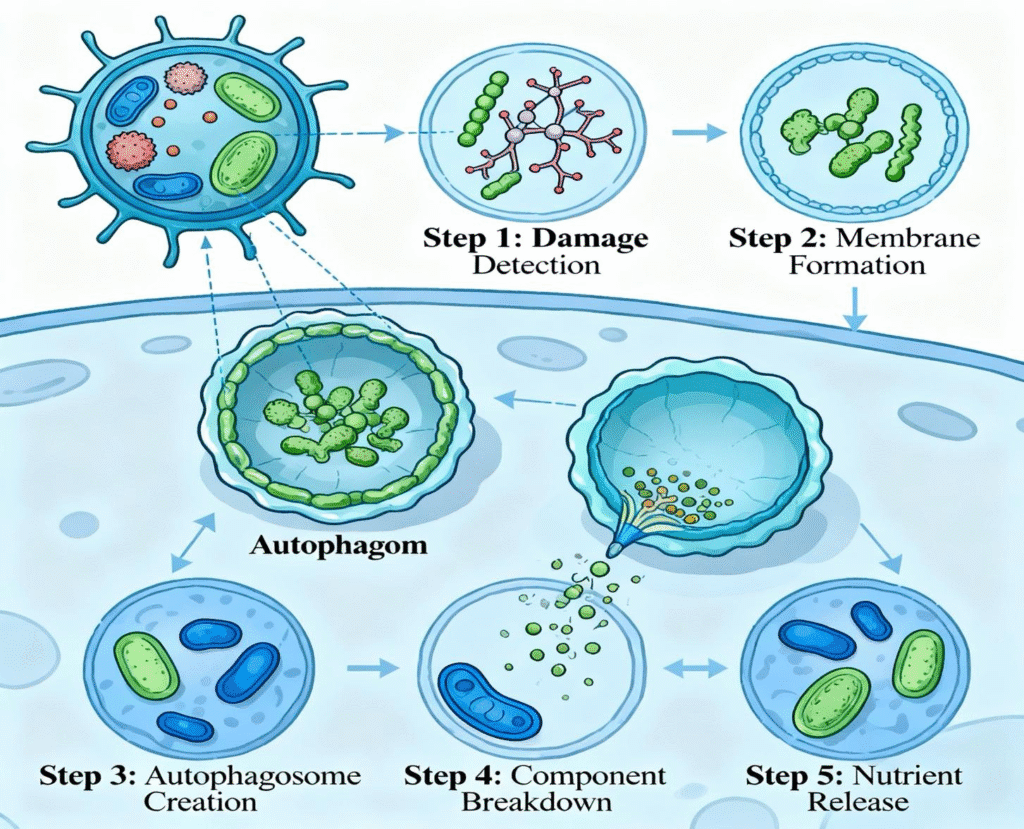
Why Autophagy Is Essential
Autophagy is not just about cleanup. It plays a major role in:
Protein quality control by removing damaged proteins that interfere with cell function
Energy efficiency by recycling nutrients during fasting or stress
Defense by clearing bacteria, viruses, and other invaders
Cell protection by preventing DNA damage and mutations that can lead to cancer
Reducing inflammation by keeping the immune system balanced
The challenge is that as we age, autophagy slows down. Damaged proteins, dysfunctional mitochondria, and other cellular debris begin to accumulate, which contributes to many age-related conditions. Supporting autophagy may help keep cells youthful and reduce the risk of chronic disease.
Autophagy and the Aging Process
One of the most important discoveries in aging research is that autophagy naturally declines as we get older. In youth, cells are efficient at identifying and removing damaged components. But with age, this quality-control system becomes less active, and “cellular clutter” begins to build up.
This includes:
- Damaged or misfolded proteins
- Dysfunctional mitochondria
- Cellular debris and lipid deposits
- Advanced glycation end products (AGEs), harmful compounds linked to oxidative stress and inflammation
Over time, this accumulation contributes to many of the hallmarks of aging, such as slower metabolism, increased inflammation, reduced energy, and a higher risk of chronic disease.
The good news is that research shows autophagy is not a one way decline. With the right interventions including fasting, exercise, and targeted therapies it is possible to stimulate autophagy even later in life. By doing so, we can potentially slow cellular aging, improve resilience, and reduce the risk of age related diseases.

How to Enhance Autophagy
The exciting news is that autophagy can be stimulated through lifestyle practices and advanced therapies.
Fasting and Caloric Restriction
Fasting is one of the strongest ways to activate autophagy. When your body is not receiving food, it switches into maintenance mode and ramps up repair.
Intermittent fasting often follows a 16 hour fast with an 8 hour eating window.
Twenty four hour fasts can be performed once or twice a week.
Extended fasts of 48 to 72 hours should only be done under medical supervision.
Even mild calorie restriction, such as eating 10 to 30 percent fewer calories, can enhance autophagy without requiring full fasting.
Exercise
Exercise, especially when combined with fasting, is another powerful trigger.
High intensity interval training is highly effective for muscle health.
Resistance training helps preserve strength with age.
Endurance workouts such as long walks, cycling, or running promote whole-body autophagy.
Ketogenic Diet
A ketogenic diet, which is very low in carbohydrates and high in healthy fats, mimics many of the same effects as fasting. It encourages ketone production, lowers insulin, and activates autophagy.
Heat and Cold Therapy
Saunas, hot baths, cold plunges, and cryotherapy all create small stress signals that activate autophagy pathways.
Supplements That Support Autophagy
Lifestyle strategies should always come first, but supplements can add another layer of support.
Spermidine is one of the most promising. It directly activates autophagy and is naturally found in wheat germ, aged cheese, mushrooms, soy, and legumes. PUR-FORM offers pharmaceutical grade IV spermidine, which provides maximum absorption and effectiveness.
Resveratrol is found in grapes and red wine and supports healthy aging pathways. PUR-FORM provides an IV form for optimal delivery.
Green tea extract or EGCG activates autophagy and protects the brain and heart. Also available intravenously.
Curcumin is the active compound in turmeric. It reduces inflammation and supports cell repair.
Berberine helps regulate blood sugar and metabolism.
Quercetin is found in apples and onions. It strengthens antioxidant defenses.
NAD precursors such as NR and NMN improve mitochondrial function and DNA repair.
Rapamycin is one of the strongest autophagy activators but requires careful medical supervision.
At PUR-FORM, we specialize in IV versions of these compounds for patients who want the most effective and bioavailable option.
Putting It All Together
An effective autophagy protocol often includes a mix of lifestyle and therapeutic approaches.
Starter plan
Intermittent fasting of 14 to 16 hours daily
Exercise three to four times per week
Oral spermidine or green tea consumption
Advanced plan
Twenty four to forty eight hour fasts monthly with medical supervision
High intensity interval training and resistance training weekly
Ketogenic style eating
Monthly IV therapy sessions with spermidine, curcumin, and resveratrol or EGCG
Conclusion: The Future of Healthy Aging
Autophagy is your body’s built-in renewal system that cleans, repairs, and rebuilds your cells. By supporting this process through fasting, exercise, nutrition, and advanced therapies, you can slow the aging process, protect your brain and heart, improve metabolic health, strengthen immunity, and extend your healthspan, the years you live fully and vibrantly.
At PUR-FORM, we believe the future of medicine is not just about treating disease. It is about optimizing the body’s most fundamental processes. Enhancing autophagy is one of the most promising frontiers in regenerative medicine, and with the right approach, it can help unlock a longer and healthier life.
— Dr. P
